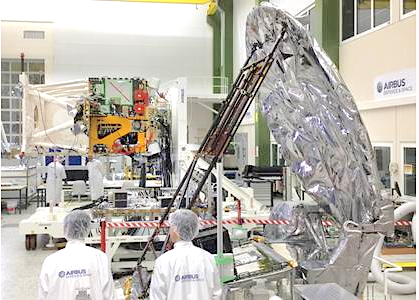
The Japanese Cloud Profiling Radar (foreground right) will be assembled to ESA´s EarthCARE satellite which is under development at Airbus. Photo: Airbus DS GmbH / Mathias Pikelj

EarthCARE will collect global simultaneous observations of cloud and aerosol profiles together with solar and thermal radiation and will include these parameters in numerical weather and climate models.
In the coming weeks, JAXA and ESA teams will run final checks on the instrument before giving a "green light" to the Airbus project team to integrate it with the spacecraft. Once assembled on EarthCARE, it will be tested intensively for several weeks. Then the instrument will be handed back to JAXA for further adjustments before its final integration next year.
Due for launch in 2019, EarthCARE will advance the understanding of the role that clouds and aerosols play in reflecting incident solar radiation back to space and trapping infrared radiation emitted from Earth’s surface. Energy in the atmosphere is balance between incoming light from the Sun, which heats Earth, and outgoing thermal radiation, which cools Earth.
Clouds and, to less extent, aerosols reflect incident solar light back out to space, but they also trap outgoing infrared light. This leads to a net effect of either cooling or heating of the planet. In addition, aerosols influence the life cycle of clouds, and so contribute indirectly to their radiative effect.
The CPR instrument is one of four instruments to be integrated on the EarthCARE satellite. This high power millimeter-wave radar will measure the vertical profiles of cloud structures (water / ice content).

